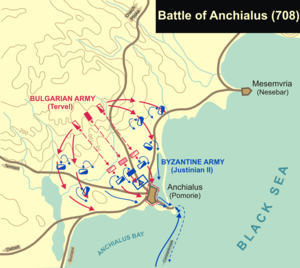Battle of Anchialus (708)
| date | 708 |
|---|---|
| place | near Anchialos (today Pomorie in Bulgaria ) |
| output | Defeat of the Byzantines |
| Parties to the conflict | |
|---|---|
| Commander | |
|
Emperor Justinian II |
|
| losses | |
|
heavy |
unknown |
The Battle of Anchialus ( Bulgarian Битка при Анхиало ) was a conflict between the Byzantine Empire and the First Bulgarian Empire . The battle took place in 708 between the present Bulgarian cities of Burgas (the former Aquae Calidae and Pyrgos) and Pomorie (the former Anchialos) and ended in a clear Byzantine defeat.
prehistory
In 678, Bulgarians with several Slavic tribes founded the First Bulgarian Empire in Moesia in 678 under the leadership of Asparuch . In the years 679 and 680, the Byzantine emperor Constantine IV. Pogonatos made unsuccessful attempts at submission . In the summer of 680 he undertook a campaign against the Bulgarians. The war ended in 681 with a peace treaty. The Byzantine Emperor Constantine IV. Pogonatos actually recognized this empire, the new state of Bulgaria, by treaty in the summer of 681. In addition, the treaty regulated the new state borders, a naval moratorium and a tribute obligation for Constantinople. Bulgaria thus became the third recognized state in Europe and one of the few to which the Eastern Roman Empire was subject to tribute. The Bulgarians eventually moved their capital from Ongal in northern Dobruja further south to Pliska.
The territory of the First Bulgarian Empire was expanded considerably under Asparuch's successor, Khan Terwel (700–721). During this time Bulgaria developed into a serious political force.
The Byzantine Empire was in a crisis at that time ( siege of Constantinople (674–678) ) and its eastern borders were besieged by the Arabs ( Islamic expansion ).
The Byzantine Emperor Justinian II fell victim to a conspiracy in 695. His opponents managed to trigger a revolt of the capital's population through an intrigue. It was claimed that the emperor wanted to have the patriarch murdered and massacre in Constantinople. This baseless rumor was immediately believed. Justinian was arrested in order to publicly humiliate him , his nose was cut off in public in the hippodrome , hence his nickname Rhinotmetos ('with the cut off nose'). Then he was exiled to Kherson in the Crimea (near present-day Sevastopol ). Soon he fled to the Khazars , where he married the sister of the ruler, a princess from the Khazars people.
In 705, the Bulgarian Khan Terwel helped the former Emperor of Byzantium, Justinian II , regain the Byzantine throne after spending ten years in exile. In gratitude, Justinian gave the Bulgarian ruler large amounts of gold, silver and silk as well as the strategically important area of Sagore between today's Stara Sagora , Sliven and the Black Sea . He also gave him the high Byzantine title of Caesar and had a monument erected in the hippodrome of Constantinople.
But just three years after Justinian had regained the throne, he thought himself strong enough to retake the territory and marched towards Bulgaria to reclaim Sagore .
The battle
In 708 a Byzantine cavalry detachment reached Anchialos ( Greek Ἀγχίαλος ; near today's Pomorie). The Byzantines embarked in Anchialos and set up camp near the fortified city without being aware of the presence of the Bulgarian army nearby, as it was hiding behind the mountains of the region.
In their certainty of victory, the Byzantines had neglected to militarily secure their camp. When Justinian's troops were busy organizing supplies in the surrounding area, they were attacked by the Bulgarian cavalry. At the same time, the Bulgarian infantry attacked the Byzantine camp. This surprise attack against the unorganized army of the emperor led to heavy losses of the Byzantines, who also lost a large part of their horses and weapons. The emperor and a small part of his troops were able to get into the fortress to safety and sailed back to Constantinople unnoticed on the night of the third day after the battle .
consequences
After the defeat of the Byzantines, Sagore remained in the possession of the Bulgarians for several centuries. Bulgaria consolidated its position in the new areas south of the Balkan Mountains .
In 711 Justinian II again sought help from Terwel to regain his lost throne. However, given the previous attack by the former Byzantine emperor at the Battle of Anchialus, the Bulgarian ruler only sent him 3,000 men. Justinian II lost his life in the ensuing battles. However, the Bulgarian troops involved were granted free withdrawal to Bulgaria by the new Byzantine emperor.
literature
- Атанас Пейчев и колектив, 1300 години на стража, Военно издателство, София 1984.
- Йордан Андреев, Милчо Лалков, Българските ханове и царе, Велико Търново, 1996.
